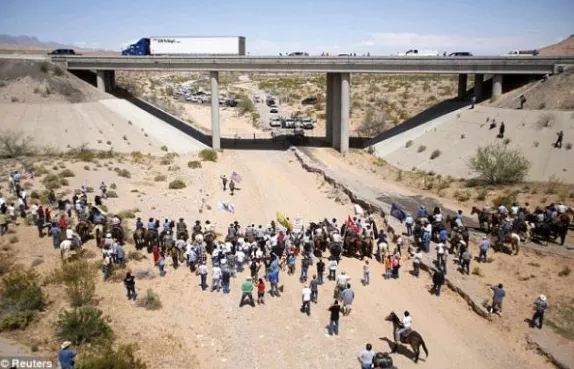In ConLaw today, I spent some time unpacking the legal issues in the recent Bundy Ranch standoff. There are a lot of thick and thin constitutional questions.
First, Bundy seems to reject the Constitution’s property clause. (It was a wonderful twist of scheduling fate that I assigned the “Property Clause” in ConLaw the week after the Bundy Ranch standoff. ) In an interview he said that the federal government has “no jurisdiction or authority” on his grazing rights. Under the Property Clause, Congress has the power to “dispose of and make all needful Rules and Regulations respecting the Territory or other Property belonging to the United States.” The land at issue was owned by the United States prior to Nevada statehood as a territory. I suspect Bundy will argue that his family has obtained a prescriptive easement on the land, as it has continuously, openly, and (absolutely) hostilely, grazed on the land for 170 years. Though, adverse possession is not permissible against the federal government.
Second, Bundy does not accept the supremacy clause, as he said he has “no contract with the United States government.” To the extent that BLM, pursuant to the Property Clause enacts regulations concerning land the government owns, then yeah, he has a contract with the government. Those are the Supreme Laws of the land.
Third, Bundy has an odd vision of the Equal Footing Doctrine, which he claims allows him to ignore federal law:
“At the moment of statehood, what happened?” Bundy asked. “At the moment of statehood the people of the territory become people of the United States with the Constitution, with equal footing to the original 13 states. They had boundaries allowing them a state line. And that boundary was divided into 17 subdivisions, which were counties. Which I live in one of those counties, Clark County, Nevada.” “As a citizen of that county, I abide by all the state laws,” he concluded.
The equal footing doctrine states that all states must be admitted to the union with equal rights and powers. But the equal footing law doesn’t permit the residents of Clark County to ignore the Constitution any more than the citizens of one of the original 13 colonies. Those are the thin issues.
Fourth, and this goes meta, the Bundy standoff raises Cooper v. Aaron issues about the supremacy of federal law, and resistance to court orders. Walter Olson links to comments made by Ted Frank that are directly on point.
I hate to see how many on my side who are upset at Obama’s violation of the Rule of Law cheer the Bundys’ criminal contempt of a court order. The Bundys are claiming a right to graze upon federal lands without paying or consent of the landowner on the grounds that the federal government has no sovereignty over Nevada. The US BLM has taken twenty years and multiple court proceedings to kick them out, winning twice in the Ninth Circuit. In response, armed militias showed up this week to defend the Bundys, who have threatened range war. The government has temporarily caved to avoid the possibility of armed confrontation. This really isn’t a close question, and threatens to tar all small-government and Second Amendment supporters.
Ted is exactly right. It is really, really important for people to follow court orders–even based on silly laws enforced in a ridiculous manner. The idea of a self-organized militia aiming sniper rifles at federal agents enforcing a court order is a very dangerous proposition. If one of those guys had pulled the trigger, we would have had a massive blood bath.
This brings me to Cooper v. Aaron. Although that case involved government officials flagrantly ignoring court orders, a similar dynamic happens when individuals flout a court order. Usually if one or a few people ignore a court order, they are arrested, and prosecuted. But when 1,000 militiamen swarm around federal agents, the normal rules are out the window.
Fifth, this standoff raises inevitable questions about the Second Amendment. I have often discussed the Second Amendment in terms of being a “doomsday provision,” to quote Judge Kozinski (see here, here, and here). This is the right that kicks in when all other rights fail. A student asked at what point should society turn to arms (this is Texas after all). I responded that this is a question I pray none of us ever have to confront in our lifetimes, and that we should all attempt to work within the system, at every juncture. I also recalled Jefferson’s sentiment in the Declaration that a society should not rebel for “light and transient causes.”
Confrontations like that at the Bundy Ranch illustrate what I refer to as “shit getting real.” What happens when 1,000 militia men refuse to obey federal law, even under a flawed understanding of the Constitution, confront federal officials. In the end, I ducked the question, but let the class think about it for themselves. I still am.
